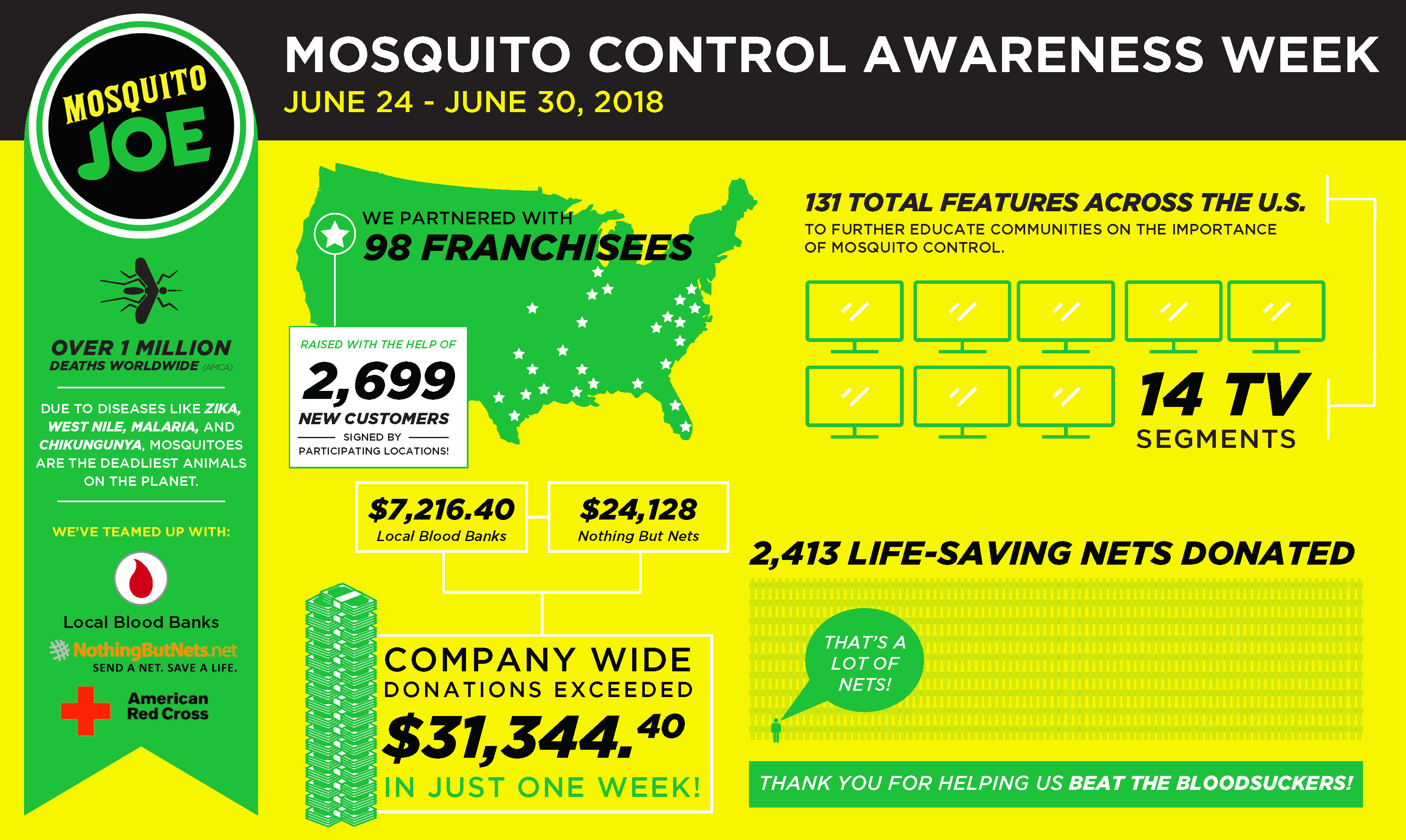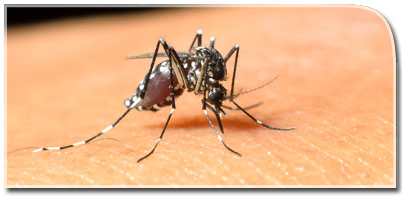Beat the Bloodsuckers: Mosquito Control Awareness Week 2018
Each year Mosquito Joe recognizes the importance of Mosquito Control Awareness Week through our Beat the Bloodsuckers campaign. Our goal is to raise awareness in the communities in which we operate about the importance of mosquito control and the amazing work of non-profits like blood banks and Nothing But Nets. Although this week falls during one of our busiest months of the year, it does not stop our passionate franchisees from giving back in their communities. This year, National Mosquito Control Awareness Week(MCAW), recognized by the American Mosquito Control Association, fell on June 24th – June 30th, and it was a memorable week for Mosquito Joe.
Mosquitoes date back to over 100 million years, which means they’re not going anywhere anytime soon so it’s important to protect your families and furry friends. Not only are they nuisances who ruin your outdoor fun, but they can transmit dangerous diseases such as Zika, West Nile Virus and Eastern Equine Encephalitis (EEE). The diseases mosquitoes carry make them one of the deadliest creatures on earth, responsible for over 1 million deaths every year. Luckily, here in the U.S. we’re able to combat these pesky bugs with a professional mosquito control service like Mosquito Joe. Our franchisees are dedicated to spreading awareness about mosquitoes and the illnesses they cause as well as working to fight off mosquito populations in their local areas. MCAW brings professional mosquito control to light and we’re thankful for this opportunity to give back.
Beat The Bloodsuckers
This is Mosquito Joe’s sixth year participating in our Beat the Bloodsuckers campaign. Franchisees had the opportunity to partner with a local blood bank in their area or with our philanthropic partner, Nothing But Nets. Mosquito Joe locations across the country joined with local blood banks donating 10% of new customer sales from that week to their blood bank of choice. This year we were able to donate over $7,000 and partner with 26 blood banks!
For the second year in a row, Mosquito Joe partnered with Nothing But Nets, a global grassroots campaign that was established in 2006. Since then, they’ve raised over $65 million to help deliver 12 million bed nets to families in need, along with other crucial malaria interventions like diagnostic treatments and training of healthcare workers. A mosquito net sent to someone in need is just $10; for every new Mosquito Joe customer signed during MCAW, a net was sent! This year our company raised over $24,000, sending 2,413 life-saving nets during Mosquito Control Awareness Week to those in need!

The Buzz!
Our amazing franchisees were out there rocking it in their local communities to spread awareness around the importance of mosquito control. Mosquito Joe locations were featured 131 times across the U.S. and secured 14 TV segments in just one week. We’re excited so many franchisees were able to further educate their communities on mosquito control, and how important it really is to keep our families and furry friends itch-free! Check out a few highlights below:
- Mosquito Joe of Lafayette-Lake Charles: Southern storms have nothing on this company called ‘Mosquito Joe’
- Mosquito Joe of Springfield: Save your blood for donations instead of giving it to mosquitoes
- Mosquito Joe of Baton Rouge: Officials offer tips during national Mosquito Control Awareness Week
- Mosquito Joe of Spartanburg: Mosquito Joe Celebrates Sixth Annual Beat the Bloodsuckers Campaign
We’re very proud of our franchisees and so happy we were able to give back to these non-profit organizations by supporting the amazing work that they do through our 2018 Beat the Bloodsuckers campaign. Mosquito Joe continues to partner with Nothing But Nets through our ongoing MoJo Bites Back campaign. To support us in our mission, consider donating to our MoJo Bites Back campaign as we raise funds for malaria and bring awareness to malaria-stricken areas. It will only cost you $10 to send a net; make a difference for a family in need today
Thanks to our participating franchisees, each blood bank that we partnered with, Nothing But Nets, and our AMAZING customers that helped make this year’s Beat the Bloodsuckers campaign the huge success that it was.
 Outside is fun again.
Outside is fun again.

